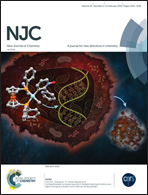{[Ru(bda)]xLy}n cross-linked coordination polymers: toward efficient heterogeneous catalysis for water oxidation in an organic solvent-free system†
Abstract
Recently, the development of polymeric catalysts for water splitting has received an increasing amount of attention. In this study, we successfully developed a few novel cross-linked coordination polymers (CCPs) with the formula {[Ru(bda)]xLy}n as efficient heterogeneous catalysts for water oxidation in an organic solvent-free system, where Ru(bda) represents the catalytic center. Detailed water oxidation catalytic kinetics studies suggested that single-site water nucleophilic attack (WNA) is the general mechanism applied to these polymeric catalysts, which is different to the small-molecular reference, [Ru(bda)(pic)2] (pic = 4-picoline). The experimental evidence also indicated the importance of interfacial wettability and the existence of the Ru(bda)-macrocyclic fragments in the polymer network in determining the overall catalytic activity. More interestingly, end-capping modification via the pyridine/DMSO exchange reaction further removed the residual Ru(DMSO)x moieties on the surfaces of the polymer network, which leads to the improved performance with an impressive TOF of ∼4.6 s−1 and TON of ∼750 in an organic solvent-free system, which are superior to [Ru(bda)(pic)2]. The rate of catalysis is among the highest for a heterogeneous system reported to date. An electrochemical study showed the polymeric catalysts were also promising electrode materials for electrocatalytic water oxidation and an electrode based on CCP/Nafion/ITO maintained ∼73% of its initial activity after 27 cycles under the optimal conditions.
![Graphical abstract: {[Ru(bda)]xLy}n cross-linked coordination polymers: toward efficient heterogeneous catalysis for water oxidation in an organic solvent-free system](/en/Image/Get?imageInfo.ImageType=GA&imageInfo.ImageIdentifier.ManuscriptID=C7NJ04330A&imageInfo.ImageIdentifier.Year=2018)


 Please wait while we load your content...
Please wait while we load your content...